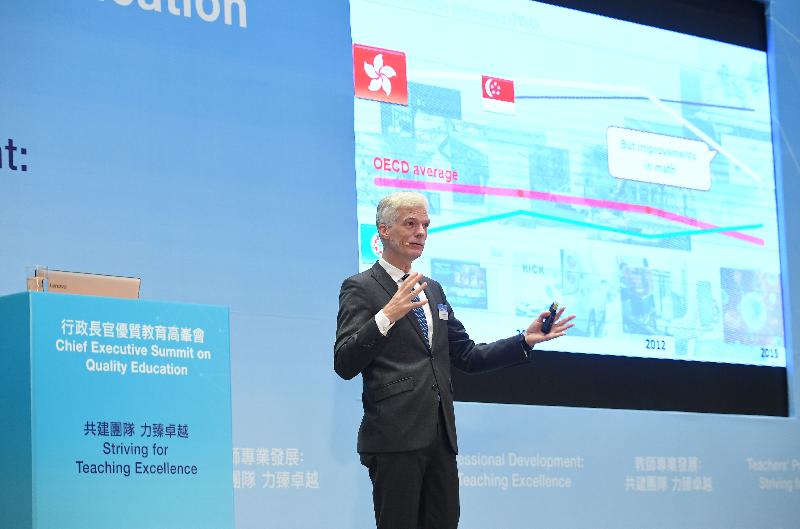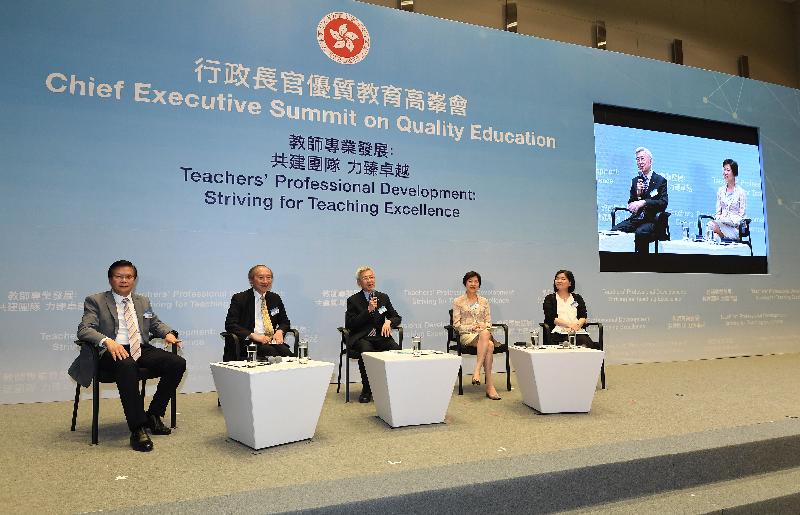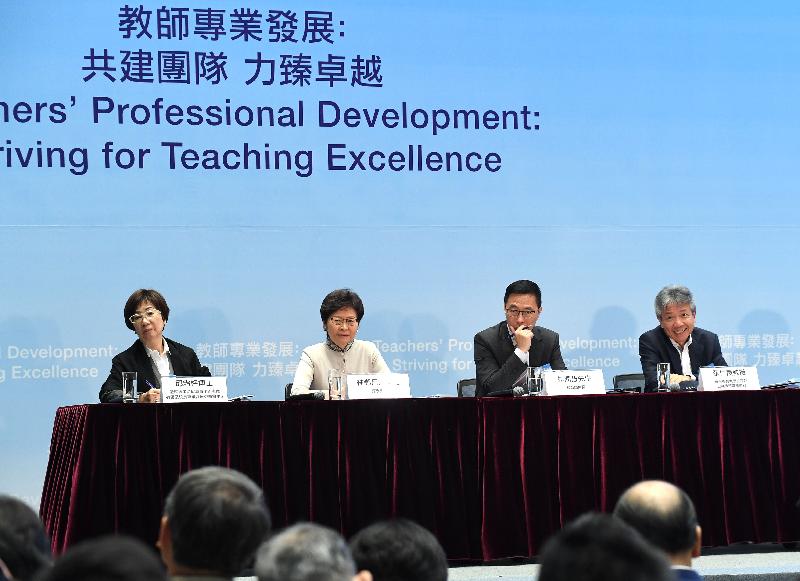The Chief Executive, Mrs Carrie Lam, chaired the Chief Executive Summit on Quality Education today (June 2). With the theme of “Teachers’ Professional Development: Striving for Teaching Excellence”, the Summit included a keynote speech delivered by an education expert from the Organisation for Economic Co-operation and Development (OECD), Mr Andreas Schleicher. Representatives of different stakeholders of the education sector shared experiences and suggestions in respect of teachers’ professional development in the panel discussion.
The Summit was attended by nearly 500 guests representing stakeholders of the education sector including teachers and principals of kindergartens, primary and secondary schools, school sponsoring bodies, school councils, university academics and parent organisations.
In her opening remarks, Mrs Lam said that talent was the most important element in Hong Kong’s continued development and education was the key to nurturing talent. The Government’s expenditure on education is therefore the most significant investment for the future. Mrs Lam has promised new education resources amounting to $5 billion annually, covering different areas ranging from kindergarten to university. It is the Government’s key objective to create a stable, caring, inspiring and satisfying teaching and learning environment for our students, teachers, parents and principals. She hoped that through the concerted efforts of all, Hong Kong’s future generations would become quality citizens who are socially responsible and equipped with a sense of national identity, a love for Hong Kong and an international perspective.
The Director for the Directorate of Education and Skills, and Special Advisor on Education Policy to the Secretary-General of the OECD, Mr Andreas Schleicher, gave a keynote speech under the theme of “Educating students for their future, not our past – insights from international comparisons”, analysing education policies around the world and looking at strategic studies made with a view to advancing educational development in different countries. Through reviewing the results of international assessments of different countries and regions, Mr Schleicher analysed how big data assists governments, schools and educators in promoting education changes and paradigm shifts in order to cultivate in students core competencies to take up future challenges.
Following the keynote speech was a panel discussion on nurturing talents for a quality education profession moderated by the Honorary Director of the Education Policy Unit of the Faculty of Education of the University of Hong Kong, Professor Cheng Kai-ming. Other speakers joining the discussion included the Choh-Ming Li Professor of Educational Psychology of the Chinese University of Hong Kong and Convenor of the Sub-committee on Teachers’ Professional Development of the Committee on Professional Development of Teachers and Principals (COTAP), Professor Hau Kit-tai; former principal of St Paul’s Co-educational College and council member of the Education University of Hong Kong, Dr Chan Wong Lai-kuen; Assistant to the Episcopal Delegate for Education, Catholic Diocese of Hong Kong, Mr Julian Yip; and teacher of St Francis’ Canossian School and awardee of the Chief Executive’s Award for Teaching Excellence, Ms Chong Yan-wai. They spoke on their experiences and exchanged views in respect of teachers’ professional development from multiple perspectives.
In the second half of the Summit, Mrs Lam; the Secretary for Education, Mr Kevin Yeung; the President of the Education University of Hong Kong, Professor Stephen Cheung; and the Chairperson of the Task Force on Professional Development of Teachers and Chairperson of COTAP, Dr Carrie Willis, exchanged ideas with the guests on education policies and measures. Participating guests expressed their views enthusiastically on different education issues such as the use and planning of resources, training and professional development.
Following a new initiative put forward in the election manifesto of the Chief Executive and pledged in her first Policy Address as “New Style Through Active Listening”, the Chief Executive Summit on Quality Education today enabled the Chief Executive to listen to diverse views of the education sector, bring about closer interactions between the Government and the education sector and establish better connection and communications among stakeholders to help the Government improve teachers’ professional development, refine related education policies and build a teaching profession with higher quality. Various Task Forces, which were set up to review certain areas of education policy following the Chief Executive’s 2017 Policy Address, will consider views expressed by the participants. Among them, the Task Force on Professional Development of Teachers will commence a two-month consultation later this month on the directions of recommendations, and submit a report and recommendations afterwards.
read more





